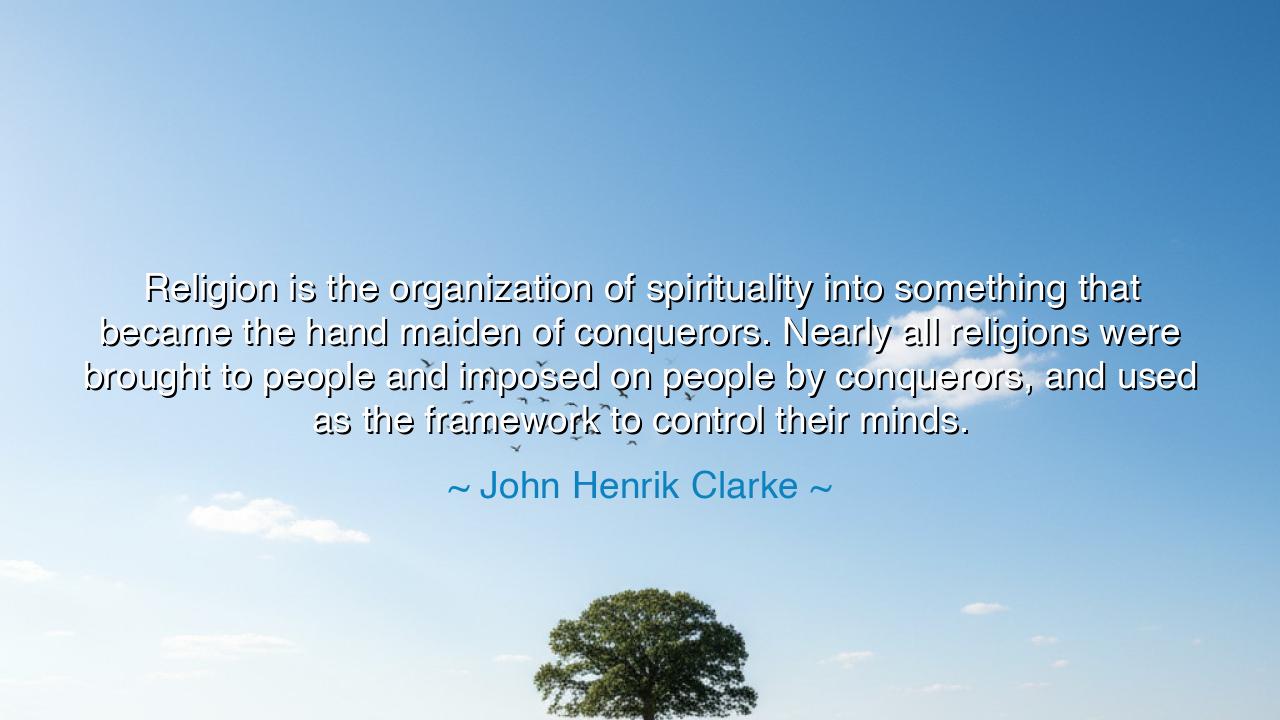
Religion is the organization of spirituality into something that
Religion is the organization of spirituality into something that became the hand maiden of conquerors. Nearly all religions were brought to people and imposed on people by conquerors, and used as the framework to control their minds.






“Religion is the organization of spirituality into something that became the handmaiden of conquerors. Nearly all religions were brought to people and imposed on people by conquerors, and used as the framework to control their minds.” Thus spoke John Henrik Clarke, the great historian and teacher of African consciousness, whose words burn like a torch in the corridors of human history. In this fierce declaration, Clarke tears away the veil that power has draped over the sacred. He reminds us that spirituality, the pure fire of human communion with the divine, has too often been captured, reshaped, and chained to the service of kings and empires. His words are not meant to destroy faith, but to awaken it — to call back the spirit from the temples of tyranny to the altar of freedom.
Clarke lived and wrote as a son of the African diaspora, a man who saw how history had been rewritten to serve the victors. His study of the world’s civilizations revealed a pattern as old as empire itself: when conquerors take a people’s land, they soon take their spirit as well. They do not destroy the people’s gods outright — they replace them, or worse, rename them. They build new altars where old ones once stood, proclaiming that the conqueror’s faith is the only path to salvation. Thus, religion — once born of love, wisdom, and the search for meaning — becomes a weapon, a framework of control, a means to bind the mind more deeply than any chain could bind the body.
Consider the story of the Spanish conquest of the Americas. When Hernán Cortés arrived upon the shores of Mexico, he came not only with soldiers and steel, but with priests bearing the cross. The native temples were toppled, their gods condemned as demons, and their sacred wisdom erased beneath the name of Christian conversion. Yet the goal was not the salvation of souls, but the subjugation of nations. The conqueror understood that when a people are made to kneel before a foreign god, their spirit bends as well. Faith, once their own, became the instrument of their own oppression. Thus Clarke speaks truth: religion, in the hands of empire, becomes not a bridge to heaven, but a fortress for power.
And yet, within this darkness, Clarke also hints at what was lost — and what can be regained. Before conquest and colonization, humanity’s spirituality was bound not to dogma, but to life itself: to the sun and the river, to the rhythm of the stars, to the voices of ancestors whispering through the wind. It was not organized, nor divided; it was a living force that united man and nature, body and spirit, tribe and cosmos. But when spirituality became organized religion, it was codified, translated into law, and placed under the guardianship of institutions. What was once personal and sacred became public and political. The divine was fenced in by doctrine, and men began to worship the structure instead of the spirit.
Clarke’s warning is not against belief, but against blindness. He does not condemn religion in its essence, but the way it has been wielded — the way it has been used to divide rather than uplift, to enslave rather than enlighten. When religion serves the conqueror, it demands obedience rather than understanding, submission rather than self-knowledge. It teaches the oppressed to wait for heaven while enduring hell on earth. But true spirituality, Clarke reminds us, is freedom — it is the voice of the divine within every person, ungoverned by priest or politician. It cannot be conquered unless we forget that the spirit belongs first to the soul, not to the state.
We see this truth echo in the lives of those who reclaimed their spiritual inheritance. When enslaved Africans in the Americas were forbidden to practice their ancient faiths, they hid their gods behind the faces of saints, preserving their traditions beneath the mask of the conqueror’s religion. From this resistance arose the syncretic faiths of Vodou, Santería, and Candomblé — living testaments that the divine cannot be truly suppressed. Though the conqueror imposed his religion, the enslaved transformed it, restoring spirit to what had been stripped of soul. Even under domination, they found freedom in the unseen realm.
And so, my child, the lesson is this: do not despise religion, but see it clearly. Seek the spirit behind the form, and question every altar that demands your submission rather than your understanding. Remember that true faith does not enslave — it liberates. True religion uplifts the heart and awakens the mind; false religion narrows both. When you pray, pray not as a subject to a distant king, but as a living spark of the divine — as one who carries the sacred flame within.
Let Clarke’s words be your compass: never allow your spirit to be owned by empire, or your faith to be used as a chain. Reclaim your connection to the divine as your ancestors once did — not through conquest or fear, but through reverence for truth, justice, and the eternal light within all creation. For the spirit, once awakened, cannot be conquered. And when men remember that the divine lies within them — not above them — then no power on earth can rule their souls again.






AAdministratorAdministrator
Welcome, honored guests. Please leave a comment, we will respond soon